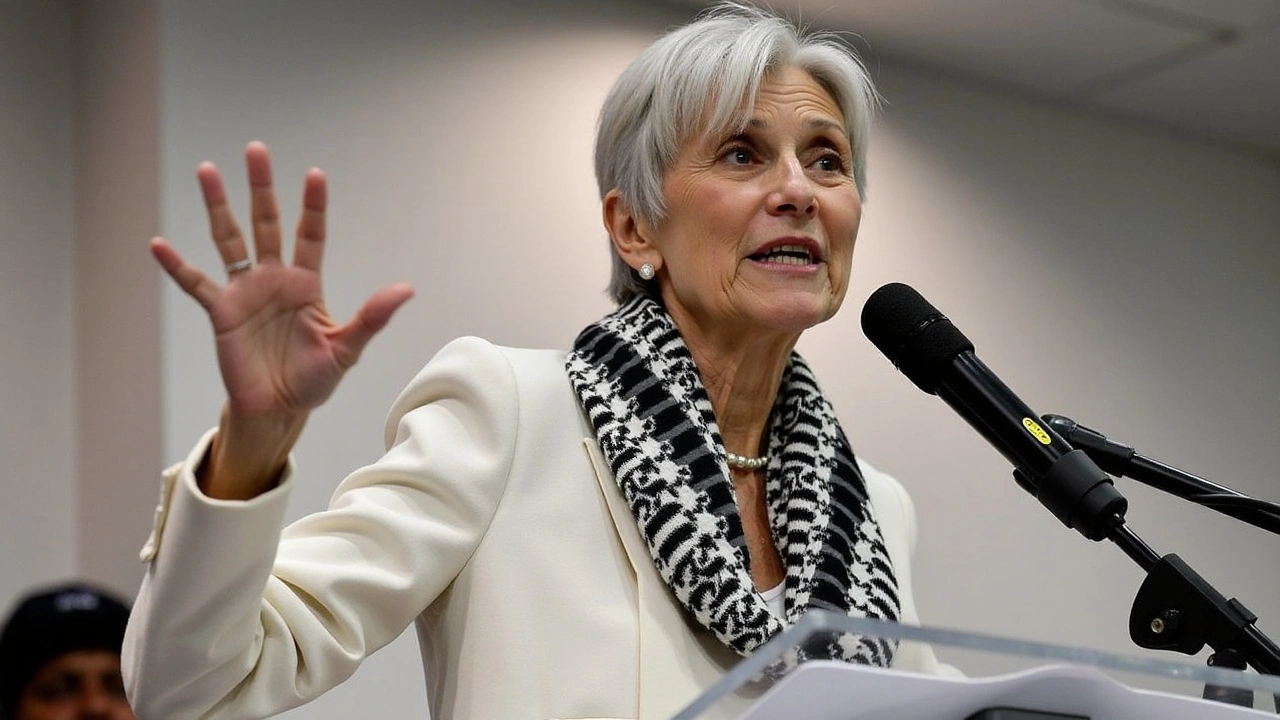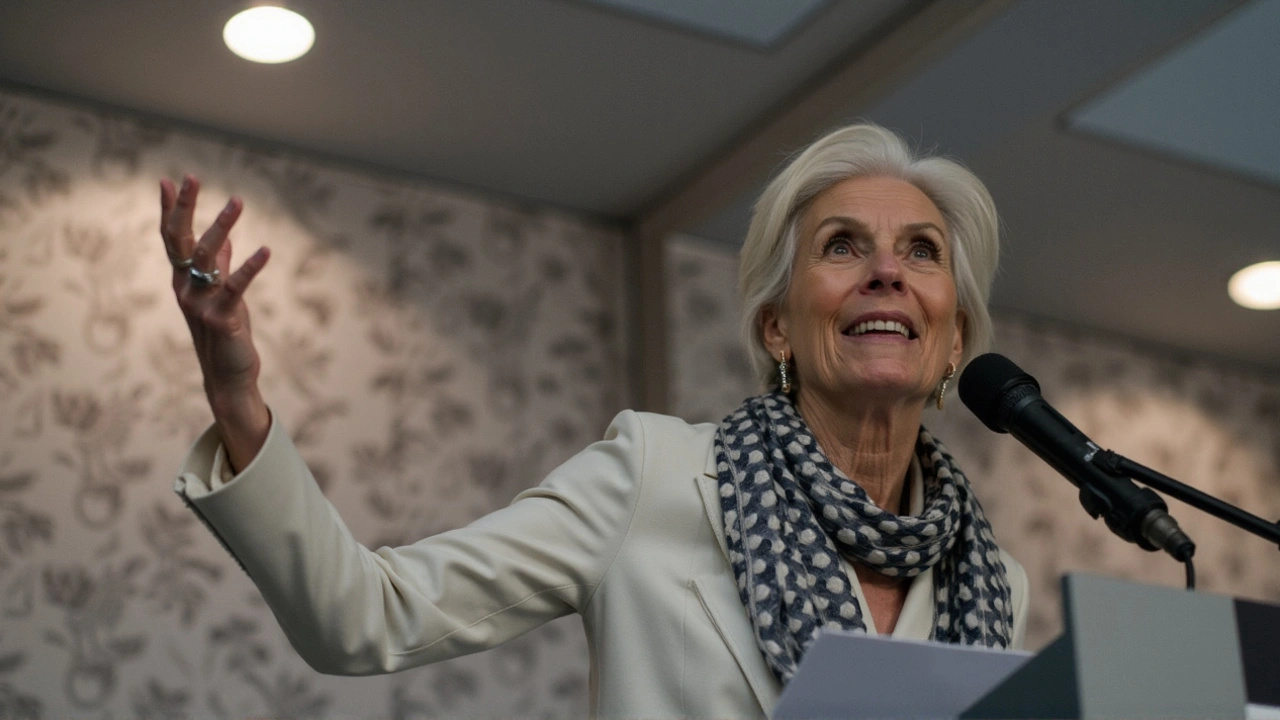The Rise of Jill Stein in the Political Arena
In the political landscape of the United States, few figures are as polarizing as Jill Stein, the 2024 presidential candidate for the U.S. Green Party. Stein’s ambition to carve out a significant role in the upcoming election has drawn considerable attention, especially with her strategic focus on key demographics in battleground states. A core part of her strategy involves engaging with the Muslim and Arab American communities, which she argues have been alienated by the Democratic Party’s stance on certain international issues. This positioning aims not only to capture these communities' support but also to potentially tip the scales in the tightly contested regions such as Michigan and Wisconsin, influencing the overall outcome of the election.
Challenges and Criticism from the Democratic Party
Stein’s bid for the presidency has not been without its share of controversy and criticism, particularly from prominent Democratic leaders. The Democrats, who perceive Stein as a threat to their voter base, have been vocal in their opposition, with Representative Alexandria Ocasio-Cortez describing her as "predatory" and dismissing her as only a quadrennial political figure. Another critic, DNC spokesman Matt Corridoni, went so far as to label her a "useful idiot for Russia," suggesting that her presence in the race undermines the Democratic effort and benefits only their Republican opponents. Despite these charges, Stein remains undeterred, arguing that such attacks have only served to increase her visibility and perhaps inadvertently bolstered her campaign.
The Impact of Middle Eastern Policies on Voter Support
Central to Stein's criticism of the Democratic Party is their handling of international conflicts, particularly those involving Israel and Palestine. She has been vocal in arguing that Kamala Harris’s approach doesn't align with the interests or desires of the Muslim and Arab American communities, proposing that a candidate like Harris fails to provide adequate representation and support for peace efforts. Stein claims that her position as an alternative allows these voters to express dissatisfaction with the current political status quo, positioning her as a voice for those advocating for significant change in U.S. foreign policy.
Allegations of Undermining and Infiltration
Beyond ideological disputes, Stein also accuses the Democratic Party of engaging in underhanded tactics to dissuade or sabotage her campaign. She asserts that the Democrats have attempted to infiltrate the Green Party by impersonating members and recruiting spies, employing legal maneuvers termed "lawfare" to challenge her party’s presence on the ballot. Such allegations, she claims, mirror the strategies used by authoritarian regimes to maintain power by quashing opposition. Despite these formidable accusations, the Democratic Party has denied any unethical conduct, maintaining that they are simply adhering to strict electoral laws and procedures.
Global Support and Its Influence
Interestingly, the discourse around Jill Stein's candidacy has transcended the borders of the United States, with external political entities like the European Green Party vocalizing their stance. They have urged Stein to withdraw from the race in favor of supporting Kamala Harris, whom they view as the only viable candidate to prevent what they see as Donald Trump's undemocratic policies from re-emerging in the White House. This call to action underscores the global significance of the U.S. presidential race, illustrating how foreign political bodies perceive and sometimes attempt to influence outcomes far from their own shores. Despite these calls, Stein and her campaign have adamantly refused to step down, reiterating their commitment to grassroots democracy and their mission to challenge the current political duopoly of the United States.

Polling Numbers and Electoral Calculations
Recent polling data, such as that conducted by The New York Times and the Siena College Research Institute, plays a crucial role in gauging the potential impact of Stein’s candidacy. With an estimated 2% of voters expressing support for Stein, these numbers, while modest, could be pivotal in a closely contested election where every percentage point matters. This support lends credence to her claim that her campaign is gaining traction, especially among disenfranchised groups seeking an alternative voice. Her candidacy's potential to act as a 'spoiler' in the 2024 elections suggests that her influence, even if limited, could indeed have significant consequences for both Kamala Harris's and Donald Trump's respective campaigns.







James Lawyer
Stein's outreach to Muslim and Arab American communities reflects a calculated attempt to fragment the Democratic base in swing states. By highlighting perceived shortcomings in Harris's foreign‑policy stance, she offers an alternative narrative that resonates with voters feeling marginalized. This approach could shift a modest but pivotal share of the electorate in places like Michigan and Wisconsin. The polling data indicating a 2 % support level suggests that even a small swing could prove decisive in a tight race. Moreover, the Green Party's grassroots infrastructure may amplify this effect if mobilized effectively.
Abby Culbertson
i think this is crazy but also kinda hopeful.
Awolumate Muhammed Abayomi
Yo, this is actually super inspiring! Stein’s focus on communities that feel ignored shows real courage, and it could energize a lot of folks who usually sit on the sidelines. If the Green Party can keep the momentum, we might see a genuine push for more inclusive policies. Keep the fire burning, team!
Josh Tate
I hear what you’re saying about the numbers, and it does feel like a tightrope. At the same time, the personal stories coming out of those communities add a human dimension that stats can’t capture. It’s important we stay empathetic and listen to what’s really driving their frustration.
John Smith
Statistically speaking, third‑party candidates have historically struggled to break the 5 % threshold needed to influence Electoral College outcomes. The 2 % figure cited aligns with past Green Party performances, which, while modest, can still act as a spoiler in swing states. It’s also worth noting that vote‑splitting dynamics often benefit the incumbent’s main opponent. In short, the math isn’t on Stein’s side, but the perception game can still shift narratives.
Alex Soete
Absolutely, the energy you’re bringing is exactly what grassroots movements need right now. Mobilizing volunteers to knock on doors and host community forums can translate that enthusiasm into real votes. Remember, every canvasser who shows up adds a layer of legitimacy to the campaign. Let’s keep the momentum alive and push for those decisive conversations in the battlegrounds.
Cara McKinzie
Wow, thanks for the “expert” breakdown-it’s almost as thrilling as watching paint dry. Guess we’ll just sit back and hope the “spoiler” myth does something magical.
Joseph Conlon
While many are quick to applaud Stein’s outreach as a bold new direction, the reality on the ground tells a different story. The demographic she targets is already fragmented across multiple party affiliations, and introducing another green banner may only deepen that division. Moreover, the resources required to mount an effective statewide campaign far exceed what the Green Party currently possesses. Historical precedents show that even well‑funded third parties struggle to maintain ballot access beyond a single election cycle. In addition, the media’s focus on sensational claims often drowns out substantive policy discussions, leaving voters with noise rather than clarity. By positioning herself as the sole voice for Muslim and Arab American concerns, Stein risks alienating allies within existing advocacy groups who prefer coalition building over singular leadership. This could inadvertently push those voters toward more established candidates who demonstrate a track record of legislative influence. Furthermore, the alleged “lawfare” tactics by Democrats, whether real or perceived, create a legal minefield that could siphon vital campaign energy away from voter outreach. The strategic calculus must also consider the potential backlash from progressive Democrats who view any Green Party success as a betrayal of the broader leftist agenda. If Stein’s candidacy does siphon even a fraction of the Democratic vote, the unintended consequence may be the election of a candidate whose policies are antithetical to her platform. Lastly, the international attention from European Green parties, while flattering, adds another layer of complexity by framing the race as a proxy battleground for foreign ideological contests. All things considered, the promise of reshaping the political landscape appears more like a mirage than a concrete plan.